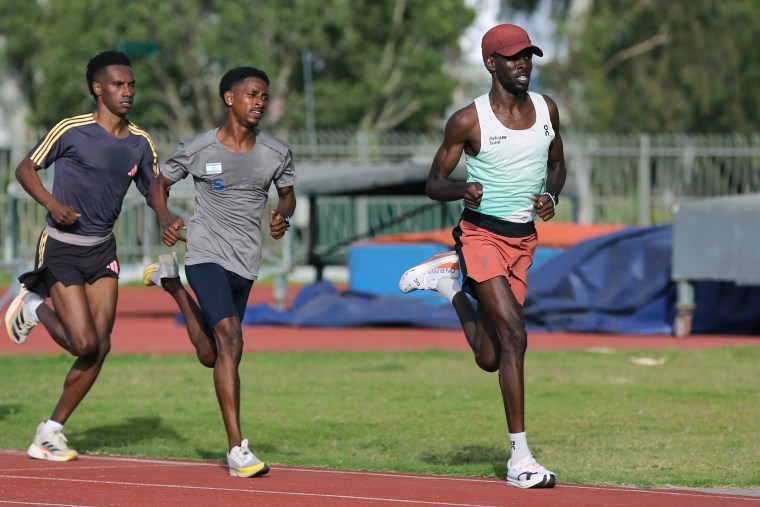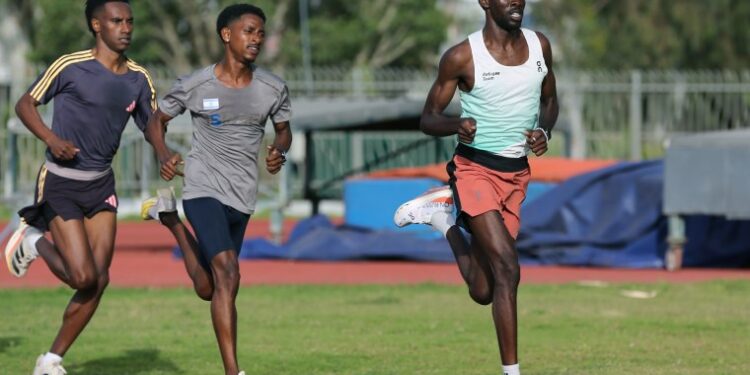TEL AVIV — In the days after Hamas attacked Israel on Oct. 7, Olympic runner Jamal Abdelmaji Eisa Mohammed struggled as conflict engulfed the country where he sought refuge from war.
As a teenager, Abdelmaji risked his life to flee ethnic violence in the Darfur region of western Sudan. Now, as a 30-year-old, he will compete in the 10,000-meter race, representing the International Olympic Committee’s refugee team for the second time in his career.
“I was really depressed, because it reminded me of every moment of Darfur and every second of Darfur I’ve been through,” he said of the attack on Israel. “I wasn’t going out. I wasn’t really training.”
Abdelmaji traveled through the Sinai Desert in 2010 to reach Israel and made a home here, living with a host family, studying and training to become a world-class runner.
His Israeli host mother, Hili Avinoam, said Abdelmaji took the attack especially hard as rocket sirens blared and the family ran for shelter.
“It was like déjà vu for what happened to him as a child,” she said. “I saw his mental health just deteriorating. I said: ‘Listen, you need to go out of the country and go train somewhere else. It’s not for you.’ He couldn’t be here.”
Abdelmaji left for a high-altitude training camp in Ethiopia for several weeks last fall before he returned to Tel Aviv. While fighting in the Gaza Strip continues, rockets are no longer a daily occurrence. With the help of his coaches and his Israeli family, he has overcome those dark days to land a spot on the IOC refugee team in Paris.
Abdelmaji achieved a personal best in the 5,000-meter run in Tokyo in 2020 as a member of the team the IOC introduced at the Rio Games in 2016 to allow displaced athletes to compete.
“Olympics is the biggest stage, but it’s also special as a refugee,” he said in an interview at a six-lane track surrounding a velodrome in Tel Aviv, where he trained for the Paris Olympics. “You represent the refugees around the world.”

Abdelmaji said he hoped to bring awareness to the ongoing conflict in Sudan, where family members still live. Sudan gained independence as a republic in 1956 but has faced ethnic, economic and religious divides ever since.
“The genocide in Sudan is really bad,” he said. “I hope maybe one day they will stop the war.”
When war broke out in 2003 in Darfur, where Abdelmaji was born, a militia attacked his village and killed 97 people, including his father. Abdelmaji, who was 8, followed his father’s advice and hid under three dead bodies.
“I was quite lucky to survive,” he said. “I just have to thank my dad every day for it.”
With his mother and younger siblings, he fled to Omdurman, Sudan’s second-largest city, neighboring the capital, Khartoum. He started cleaning shoes and trading goods on the streets to support his family.
“When I started working, I was, like, 8 years old,” he said.
In 2010, a friend told him he could flee Sudan by paying smugglers to get him to Canada via Israel. He hoped to study and support his family from abroad.
He flew to Cairo on a doctored passport that said he was 18 years old so he could travel alone. Smugglers took him by bus and pickup truck over the Sinai Desert to the Israel border, where he was dropped off about 100 feet from the borderline and told to pass through a hole in the fence.
“He told me when you put your leg after the border, nobody will ask you anymore; you are safe,” he said.
Stopped by Israeli soldiers, he spent the first days in a refugee camp before he was sent to Tel Aviv. When he arrived at the bus terminal, he felt lost because he couldn’t speak English or Hebrew.
“And then you go somewhere, different language, different people, everything is different to you, different culture, you don’t know anything,” he said.
He eventually found support at the Alley Runners Club, an organization that helps underprivileged youths. Although he had never participated in organized sports, he tried out for the team and wowed the coaches with his running times.
It was not just his speed that impressed, but his tenacity, said one of his coaches, Rotem Genossar.
“You have to have talent, but it’s about character, it’s about consistency,” Genossar said. “This is his talent. He will manage everywhere. He was managing very, very good in Khartoum alone, age of 10, and after to come here.”
Through the club, Abdelmaji met Avinoam, a volunteer who traveled with him to international competitions, often on last-minute flights after he struggled to secure necessary travel documents as a refugee.
After having spent time with him abroad, Avinoam invited him to meet her husband and their two daughters for dinner.
“We were hooked, and the kids really liked him,” Avinoam said. “And he came, and since then he’s living with us, and I can’t remember him not living with us.”
Abdelmaji said: “They “changed my life. Without them, I’m sure I was going to be struggling.”
The family was there for him when the pandemic disrupted the 2020 Tokyo Olympics and he had to train in the seaside park in front of their home in Tel Aviv.
“It was a pretty difficult time,” said his host father, Asaf Roz. “Eventually in 2021 when he got to the Olympics, it was without crowds. We couldn’t be there. We were sitting here with all his friends at home.”
But they will be in Paris.
“We are ecstatic. Really, really looking forward to it, to be there with him in all this,” said Roz, who’s an avid runner. “We’ve never been to the Olympic Games, which is a dream coming true for us. But to be there with him when he’s competing, we couldn’t ask for anything more than that.”






